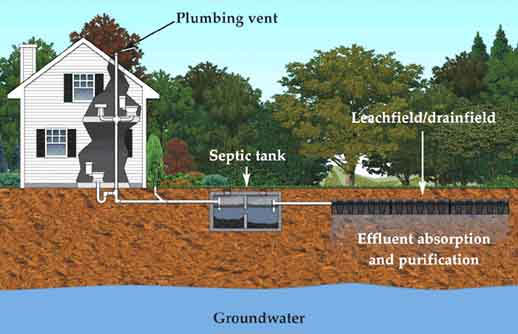 Proper septic system care and maintenance is one of the most overlooked items on most traditional home maintenance sites. Granted most of these sites are from places located in a city, but with 1 in 4 Americans basically are on one… Well this week the EPA has decided to try to raise awareness by holding their 1st annual SepticSmart Week. Their main goal is to encourage homeowners to take action to ensure their septic systems are functioning properly.
Proper septic system care and maintenance is one of the most overlooked items on most traditional home maintenance sites. Granted most of these sites are from places located in a city, but with 1 in 4 Americans basically are on one… Well this week the EPA has decided to try to raise awareness by holding their 1st annual SepticSmart Week. Their main goal is to encourage homeowners to take action to ensure their septic systems are functioning properly.
Failure to maintain and service a home’s septic system can lead to system back-ups and overflows, which can result in costly repairs, polluted local waterways and risks to public health and the environment. Many septic system failures occur during the winter holiday season, so EPA is encouraging homeowners to get their septic systems inspected and serviced now before licensed inspectors’ schedules fill up around the holidays. (We actually recommend around July)
“By taking a few small, simple steps to care for their home’s septic system, homeowners can help protect the health of their community and their local waterways, while preventing potentially costly repairs to their septic system that can occur if the system is not properly maintained,” said EPA Acting Assistant Administrator for Water Nancy Stoner.
Some of their SepticSmart tips are:
- Protect It and Inspect It! Homeowners can save more than $10,000 in repair and replacement costs if they have their septic system inspected at an average cost of $200-350 at least every 3-5 years by a septic service professional. (For More – see our FAQ’s on Septic Systems)
- Think at the sink! Whether you flush down the toilet, grind it in the garbage disposal, or pour it down the sink, shower, or bath…what goes down the drain can have a major impact on how well your septic system works (For More – see our Piece on Garbage Disposals & why a Garbage Disposal should never be used on such systems).
- Don’t overload the commode! Only put things in the drain or toilet that belong there. For example, coffee grounds, dental floss, disposable diapers and wipes, feminine hygiene products, cigarette butts, and cat litter can all clog and potentially damage septic systems.
- Don’t strain your drain! Efficient use of water and staggering water can not only improve the operation of your septic system but also reduce the risk of failure as well.
- Consider fixing plumbing leaks and installing faucet aerators and water-efficient products that bear the EPA WaterSense label (Fixing leaks wont do diddly for the system but still a very good reminder)
- Spread out laundry and dishwasher loads throughout the day.
- Shield your field! What is placed on or around your drainfield—a component of your septic system that removes contaminants from the liquid that emerges from your septic tank – matters. (i.e. don’t park on the field or tank itself, the results, well lets just say they are not pretty sometimes)
More Helpful Tips & Links:
- The EPA & Many states have some great resources on Septic systems which we recommend you check out. For more the EPA’s official site for Septic Smart week is: http://water.epa.gov/infrastructure/septic/septic-smart-week-2013.cfm
- Just because you live in the city & maybe get a sewer bill doesn’t mean you are not running on a septic system – many older homes used them before the more modern treatment plants came on line or service was ran to their area – if you are one of those lucky ones that is still on septic it really does pay to maintain yours as most individuals pay more for the treatment than they do the water they use…
- Consider a gray water system if practical, not only will that reduce your septic systems load it can also reduce your water usage which gives you a win-win
The EPA also put together this handy Info-Graphic – to see the full size one click HERE


I agree. There is really no excuse for not using a monthly treatment to maintain your septic tank and interior piping. Nowadays, the vast majority of household cleaners and wipes are anti-bacterial.
Good point on anti-microbial though many people used to use bleach & other similar products which also killed off the good organisms. As an FYI, the treatment’s don’t do anything for piping, it is just for helping the tank & by extension leach field work correctly. Thanks for chiming in & sorry but I did have to remove the link